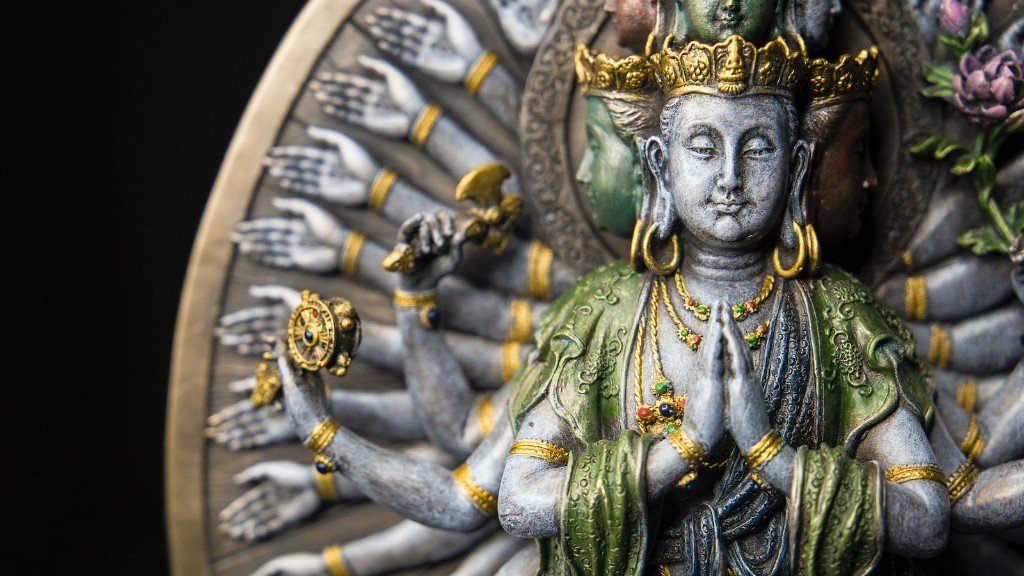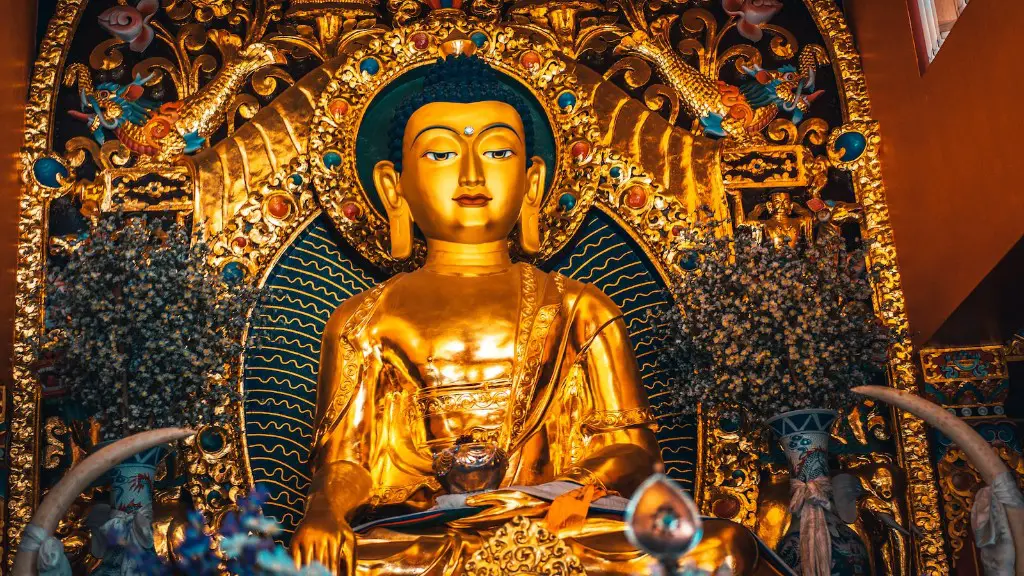Hinduism has profoundly influenced the culture and social structure of India. Its earliest roots can be traced back to 1500 BCE and its reach is seen in its varied influences in every sphere of life. It is an ancient religion that has continued to evolve over the centuries and its impact on the Indian society is apparent in the principles and practices that form the basis of the Indian way of life.
Hinduism has shaped an intricate system of both religious and social practices, which reflect the varied cultural heritages of India. Its practices are based on a central belief in karma and reincarnation, which emphasizes the importance of respecting life and the many forms it can take. Hinduism also stresses the concept of dharma, which means a moral and spiritual duty or obligation. This concept stresses the importance of forming strong and harmonious relationships with family, friends, and ultimately with God.
Hinduism has had a great influence on the organization of society in India. It has created a hierarchical structure, with a clear division between castes and varnas, as well as a deep respect for the elderly and religious figures. This hierarchical structure is often seen in civil and social life and continues to structure Indian society today. Furthermore, Hinduism’s emphasis on karma has led to the belief that one’s current economic or social status is the result of past actions in previous lifetimes and so individuals are encouraged to strive for betterment in this lifetime.
Hinduism also had an influence on the role of women in India. The traditional roles of women have been largely defined by Hindu beliefs, with men typically occupying the dominant roles in society. Women have traditionally been expected to uphold certain duties, such as household tasks and childcare, as well as taking on roles of respect and piety. However, this has gradually begun to shift in recent years with the rise of modern ideals and education.
Hinduism has had a great influence on the culture of India as well. Its teachings and beliefs have shaped the way of life in the country. Its contributions can be seen through the development of art, literature, music, and dance, as well as through language and philosophy. Examples of religious ceremonies and feasts, such as Diwali and Holi, also demonstrate how Hinduism is firmly rooted within India’s culture.
In today’s society, Hinduism continues to be a major force in Indian culture and in the shaping of Indian society. Its beliefs and practices have been an integral part of India’s social structure for centuries and will remain so for many years to come.
Hinduism and Health Practices in India
Hinduism has had a significant influence in the development of health practices in India. From traditional methods of healing to modern medical practices, Hinduism has impacted healthcare and the way in which it is administered in India. In Hindu belief, the human body is seen as an interconnected system of physical and spiritual elements, and so traditional Hindu medical practices focus on addressing health issues at a spiritual, mental and physical level. These traditional methods of healing often involve the practice of yoga and ayurveda, which aim to establish balance and harmony within the body, as well as the use of herbal remedies and massage.
Furthermore, the Hindu belief in karma has shaped Indian attitudes towards health and illness, with individuals believing that illness is the result of past actions and that it can be avoided by living a life of virtue and piety. This view has been increasingly challenged by modern medical professionals, however, it remains a strong factor in the way illness and suffering are viewed by many Hindus in India.
In recent years, there has been a rise in the use of alternative health practices in India, and the influence of Hinduism is apparent in the widespread acceptance and use of these traditional medical practices. Increasingly, traditional methods of healing, such as yoga and ayurveda, are being used in addition to modern medical practices, to treat a variety of illnesses and medical conditions. This shift towards embracing traditional forms of healing demonstrates the profound influence of Hinduism on attitudes towards health and wellbeing in India.
Hinduism and Political Structure in India
Hinduism has had a significant impact on the development of political structures in India. From ancient times, religion has been a key factor in politics and the decision-making process in India. Hindu beliefs, in particular, were often used to formulate laws and policies, which were designed to serve the people in India.
The caste system in India, while being a complex and intricate social structure, is based on Hindu beliefs and has been used as a tool to create a hierarchy, which is largely reflective of the religious and spiritual beliefs of Indians. Furthermore, Hinduism has had an influence on the ruling dynasties of India, with many ruling families claiming a divine heritage, based on Hindu beliefs in order to maintain their authority and power.
In modern times, the influence of Hinduism on politics in India is still evident, with the BJP and other Hindu nationalist political parties being strong political forces in the country. These political parties often base their policies and ideologies on Hindu religious and spiritual beliefs, seeking to use Hindu values to shape the future of the country. This demonstrates the enduring influence of Hinduism on the political system in India today.
Hinduism and Society in India
Hinduism has had a lasting impact on society in India. Its teachings and beliefs have served to shape the country’s culture, its social structures and the way in which the people of the country interact with each other. Hinduism has created a strong sense of community and cooperation, which is evident in the way in which individuals respect and support each other.
The traditional roles and norms that have been established within Indian society have largely been informed by Hinduism, with the belief in karma and reincarnation creating a sense of responsibility and communal care. Furthermore, Hinduism has had an influence on the way in which individuals interact with and treat one another, with respect and kindness being seen as fundamental values.
In modern times, the influence of Hinduism is still strong within India, with its teachings and beliefs continuing to form the basis of Indian culture and society. From traditional rituals and festivals to philosophical ideas and spiritual beliefs, Hinduism has had a profound impact on the way of life in India, both in the present and in the past.
Hinduism and Arts in India
Hinduism has had a long-standing influence on the arts in India. Its teachings have inspired a wide range of art forms, from painting and sculpture to music and dance. Hinduism has served as an inspiration for artists to create works of art that capture the beauty and complexity of its beliefs and teachings.
Hinduism is often depicted through its gods and goddesses in various works of art, from paintings to sculptures, which can be seen in temples and galleries throughout India. Furthermore, the festivals and rituals of Hinduism, such as Diwali and Holi, have been the subject of many artworks, as they provide an insight into the vibrant culture of India.
Hinduism is also evident in the music and dance of India. Traditional folk and classical music often incorporates Hindu religious and spiritual themes, while dance forms such as Bharatnatyam and Kathak are steeped in Hindu history and philosophy. These traditional art forms demonstrate how Hinduism is a central part of Indian culture and has an enduring influence on the country’s arts.
Hinduism and Education in India
Hinduism has had a major influence on the education system in India. From ancient times, Hindu teachings have been incorporated into education, with elements of Hindu philosophy and belief forming a part of the curriculum. This has created an education system that is based on the values and beliefs of Hinduism, such as the importance of understanding one’s obligations to society and to God.
Hinduism has also shaped the way in which education is viewed in India. Its emphasis on learning and knowledge has encouraged individuals to strive for educational excellence, often leading to high levels of academic success. Furthermore, Hinduism has provided a basis for the development of language, literature and philosophy, which are all integral parts of the Indian education system.
In modern times, the influence of Hinduism on education in India is still seen. Its teachings are often portrayed in textbooks and in the classroom and its values are often used to shape the way in which students approach their studies. Furthermore, many educational institutions that were established during the colonial period, such as the Banaras Hindu University, still exist today and continue to be based on Hindu values and teachings.


